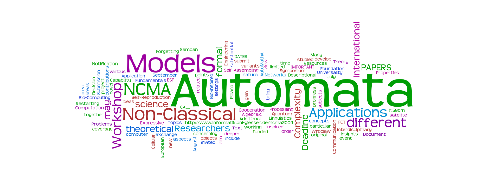Printed Proceedings of CMC11 Satellite Events

|
Henning Bordihn, Rudolf Freund, Thomas Hinze, Markus Holzer, Martin Kutrib, Friedrich Otto (Editors)
Proceedings of the Second Workshop on Non-Classical Models for Automata and Applications
Österreichische Computergesellschaft, books@ocg.at, vol. 263, 196 p., 2010
ISBN 978-3-85403-263-2
The Second Workshop on Non-Classical Models for Automata and Applications (NCMA2010) was devoted to investigate various models of non-classical automata studied both as theoretical concepts and formal models for applications in different areas. This volume contains the papers of two invited talks as well as of eleven regular contributions with topics ranging from exploiting theoretical aspects of models inspired by nature to describing mathematical formalisms for the complexity of different automata models.
|
CMC11 Satellite Events
CMC11 is flanked by several related events to
enhance cooperation and communication between researchers and
scientists in complementary fields of computer and life
science. Please feel free to take the opportunity to cross-participate
and be inspired by unconventional ideas spanning disciplines, minds,
and thought patterns. Enjoy yourself.
 |
23-24 August 2010, Jena
Many non-classical automata models are natural objects of theoretical computer science. They are studied from different points of view in various areas, both as theoretical concepts and as formal models for applications. The aim of this workshop is to bring together researchers working on different aspects of different variants of non-classical automata models in order to exchange and develop novel ideas. A deeper and interdisciplinary coverage of this particular area may gain new insights and substantial progress. |
![]() |
23 August 2010, Jena
The main aim is to bring together researchers working in membrane computing, in biologically inspired process calculi (ambients, brane calculi, etc.) and in other related fields to present recent results and to discuss new ideas concerning such formalisms, their properties and relationships (similarities, differences,...). Topics of interest include (but are not limited to) biologically inspired models and calculi, biologically inspired systems and their applications, analysis of properties of biologically inspired models and languages, theoretical links and comparison between different models/systems. |
![]() |
25 August 2010, Jena
Computational methods are becoming established
tools to face both theoretical and practical problems in ecosystems
science, epidemiology, sustainability science, evolution, and other
fields in which population dynamics and interactions with the
environment are studied. However, there are phenomena in these fields
that could be profitably studied with models and means similar to
those used in Natural Computing and Systems Biology. The aim of the
workshop is to allow researchers that might be interested in working
in formal modelling for Population Biology and Ecology to share ideas
and get in touch with each other. |





